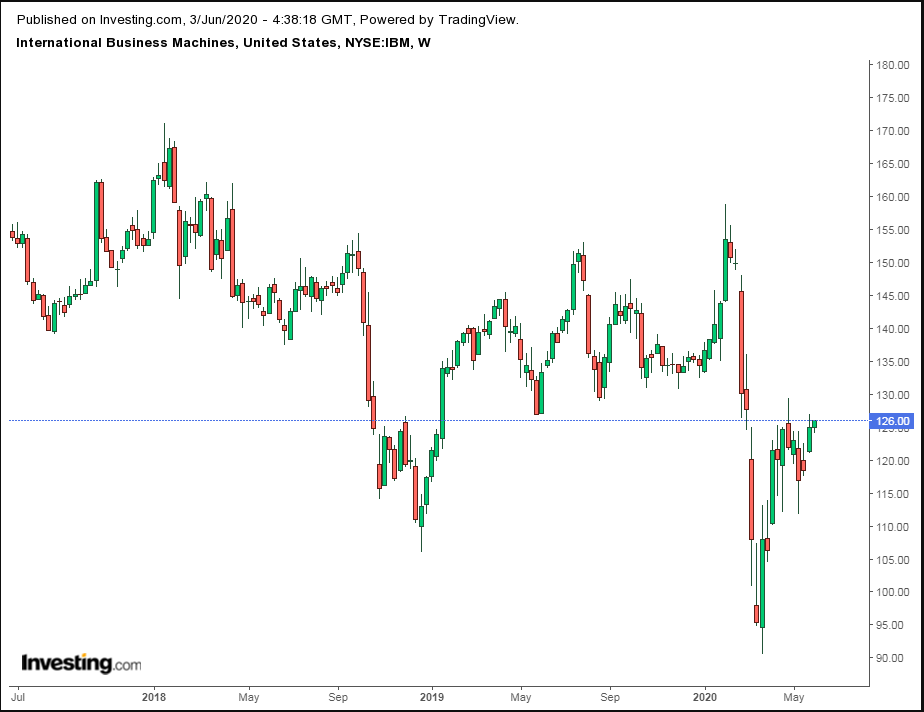Right now, International Business Machines (NYSE:IBM) is in the news for all the wrong reasons. The software and services giant is cutting thousands of jobs, struggling to remain competitive in an environment when newer technology companies dominate the market. Equally vexing, its turnaround plan is in flux after the COVID-19 pandemic hit the global economy.
According to recent news reports, IBM is in the middle of mass layoffs. Without official confirmation from the Armonk, New York-based company on the exact number, speculation is that 20,000 workers were let go in the recent round of restructuring. That could be IBM’s biggest staff reduction in a decade.

With these negative developments, IBM stock has lagged behind peers in the market recovery that started after the meltdown in March. Shares of this legacy tech giant, which dominated computing's early decades with inventions such as the mainframe and later the floppy disk, closed at $126 yesterday, down about 26% from the February high.
Investors’ biggest concern about IBM is whether Big Blue will be able to save its rock-solid dividend, which yields a robust 5.22% and provides shareholders with a $6.52 annual payout. But as the coronavirus wreaks havoc on the global economy, the dividend could come under pressure as the company’s biggest customers cut back on their IT investments and competition intensifies.
In its latest earnings report, things looked bleak for the tech giant company. It posted lower first quarter sales, withdrew annual earnings guidance because of uncertainty caused by the pandemic and took a large restructuring charge, highlighting the challenges new Chief Executive Arvind Krishna faces in trying to revive growth.
“For the next few months, we have to be focused on the stability of the business and be sure we preserve our liquidity and balance sheet,” Krishna said on a conference call as reported by Bloomberg. Moving forward, he said, the focus will be on hybrid cloud and AI, with quantum computing “coming down the road.”
The coronavirus impact will most likely hurt earnings more substantially in the second and third quarters as IBM’s large customers delay purchases of new mainframes and software. That being factored into the stock’s current valuation, we think IBM is still a safe bet for income investors who have a long-term view on the company’s turnaround plan.
Recurring Revenue Stream
To begin with, we don’t see a major impact on the company’s recurring revenue stream which mainly consists of financial services, telecom and the public sector. These areas of the economy have largely remained immune from the impact of lockdowns and closures and will help IBM weather the downturn.
“Our recurring revenue stream, continued gross profit margin expansion and strong balance sheet and liquidity position remain stabilizing elements in an unprecedented business climate,” James Kavanaugh, IBM’s chief financial officer said in the latest earnings statement.
“We’ve taken actions within our business to provide the necessary flexibility and operating efficiency for the current environment.”
IBM's new management structure, following the departure of Ginni Rometty who stepped down as CEO in April, has brightened prospects for the company’s long-term growth after many years of declining sales.
Her successor, Krishna, headed the company’s cloud and cognitive-software division. Jim Whitehurst, who was chief executive of Red Hat, the open-source software giant that IBM acquired for about $34 billion last year, was appointed the company’s president.
Rometty last year spearheaded the company’s acquisition of Red Hat, betting on hybrid cloud technology to reverse the lingering slide in sales. The acquisition is adding a relatively high-margin software business to IBM’s stable of offerings.
Red Hat sales rose 18% in the first quarter as the shift to remote work, automation and application modernization accelerated. Overall, revenue from cloud computing, which cuts across numerous divisions, was up 19%, IBM said, reaching $5.4 billion.
Bottom Line
When it comes to growth, during the past decade, IBM has certainly disappointed its investors. But after the Red Hat acquisition, and with new management in place, we see IBM getting back to a growth path once the pandemic is behind us.
IBM’s healthy balance-sheet, manageable debt and recurring cash flows make its dividend a relatively safe bet for income-oriented investors.
